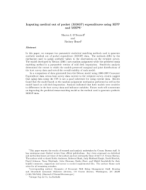
An official website of the United States government
Here’s how you know
Official websites use .gov
A .gov website belongs to an official government organization in the United States.
Secure .gov websites use HTTPS
A lock (
) or https:// means you’ve safely connected to the .gov website. Share sensitive information only on official, secure websites.
-
//
- Census.gov /
- Library /
- Census Working Papers /
- Imputing Medical Out-of-Pocket Expenditures Using SIPP and MEPS
Imputing Medical Out-of-Pocket (MOOP) Expenditures Using SIPP and MEPS
Imputing Medical Out-of-Pocket (MOOP) Expenditures Using SIPP and MEPS
Abstract
In this paper, we compare two parametric statistical matching methods used to generate synthetic medical out of pocket expenditure (MOOP) data. The methods differ by the mechanism used to assign synthetic values to the observations on the recipient survey. The model developed by Betson (2001) uses random assignment while the predicted mean matching method is a parametric version of cold deck imputation. Sensitivity analysis determined the extent to which the models preserved marginal and joint distributions of the host survey data and tested the overall stability of each model.
In a comparison of data generated from the Betson model using 1996-1997 Consumer Expenditure data versus host survey data current to the recipient survey, results suggest that aging data using the CPI is not a good substitute for using current data. Results found that the model based on the random assignment mechanism performed as well as the model based on cold deck imputation. Analysis indicated that both models were sensitive to differences in the host survey data and indicator variables. Future work will concentrate on improving the predicted mean matching model as the method used to generate synthetic MOOP data.
Others in Series
Working Paper
Working Paper
Working Paper
Share
Related Information
WORKING PAPER
Supplemental Poverty Measure Working PapersSome content on this site is available in several different electronic formats. Some of the files may require a plug-in or additional software to view.
 Yes
Yes
 No
NoComments or suggestions?


Top

